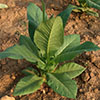| Jun 30, 2022 |
|
(Nanowerk News) Engineered nanomaterials (EMs) negatively or positively affect plant growth and development attributed to their physiochemical properties, application, and concentrations. Previous studies have shown that ferroferric oxide (Fe3O4) nanoparticles affect tobacco (Nicotiana tabacum) seed germination in size- and dosage-dependent manners. However, little attention has been paid to EMs mediated tobacco response to heavy metals.
|
|
In a study published in Journal of Nanobiotechnology (“Comparative physiological and metabolomic analyses reveal that Fe3O4 and ZnO nanoparticles alleviate Cd toxicity in tobacco”), researchers from the Xishuangbanna Tropical Botanical Garden (XTBG) of the Chinese Academy of Sciences and Shanxi Agricultural University investigated the mechanisms of nanoparticle-mediated cadmium (Cd) tolerance in plants.
|
|
Using the tobacco cultivar ‘Yunyan 87’, the researchers investigated the effects of Fe3O4 or zinc oxide nanoparticles (ZnO NPs) on plant growth and Cd responses in tobacco seedlings.
|
|
They first determined the effects of Cd on tobacco seedling growth and found that Cd treatment markedly induced growth inhibition in plant height, shoot fresh weight, root length and fresh weight. |
|
To confirm whether Fe3O4 and ZnO NPs played roles in mediating Cd response, they further applied foliar exposure to Fe3O4, ZnO NPs, and ion solutions to tobacco seedlings. Foliar exposure to Fe3O4 or ZnO NPs showed great potential in alleviating plant growth under Cd stress.
|
|
Compared with Cd-treated seedlings alone, Fe3O4, ZnO NPs, and ions significantly promoted root growth and fresh weight. Fe3O4 or ZnO NPs reprogrammed critical metabolic pathways, including alkaloids, amino acids, flavonoids, and the differentially accumulated metabolites involved in these pathways were significantly correlated with plant growth.
|
|
“Our results collectively indicate that metal nanoparticles can serve as plant growth regulators and provide insights into using them for improving crops in heavy metal-contaminated areas,” said WAN Jinpeng of XTBG.
|

